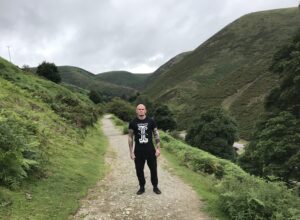
Welcome to the third and final part of Coming Out of Lockdown: Lessons Learned. I’ve been talking about the areas and subjects that I’ve been exploring and improving during this lockdown period. After a tough first week or two I’ve actually had a really good time of it and feel that when I reemerge I’ll have a lot of improvements made for moving forwards.
Today’s topics are note taking and technology addiction.
Note Taking
Aside from my training diaries, which have always been hand written, for my personal diary and any notes that I keep I have always just used the note app on my phone and laptop. Technology addiction is something I’ve also been addressing over the lockdown period, more on that below. For all the technology that I like to use I can’t get on with kindles or book apps, audiobooks aside. There is nothing like a real book. As I’m working out my triggers for tech obsession I had a realisation that putting my book down to make a note on my phone was taking me half an hour each time; 2 minutes to make the note and before I knew it I’d been on the news app or twitter for 20 minutes. Initially I thought that it was the apps themselves that were a problem, news scrolling or social media. I now know that it is the phone itself. Don’t pick the phone up and I normally end up doing something productive or meaningful. Pick it up and I can be lost for hours.
Anyway, coincidentally (if you believe in those sort of things) around the same time I’d been on the blogging course that was mentioned in last weeks article, the course asked us to read a few blogs of writers that we like. I’d just finished Ryan Holiday’s Stillness is the Key so had a look on his website, literally the first post that I saw was entitled The Notecard System: The Key For Remembering, Organising And Using Everything You Read. In the article Holiday has a link to a similar piece by his mentor, Robert Greene, famous strategist and author of the fantastic 48 Laws of Power. I’ve since been using an amalgamation of the two notecard methods. Although early days still I’m finding it very useful, particularly with writing. So many times I read a book and then a couple of months later can’t remember anything about it which, if particularly a good one, can be frustrating. Below is the simplified step by step system that I’ve been using:
Highlighting: I keep a highlighter next to each book that I have on the go, every time I pick the book up the highlighter comes with it. I even blue tack it to the front cover sometimes. Anything that I like I highlight and then dog ear the bottom of the page. This is much easier and quicker than picking the phone up, disrupting the flow of reading less.
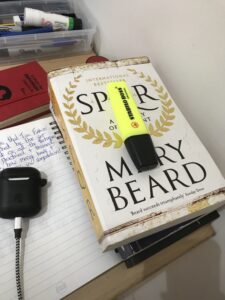
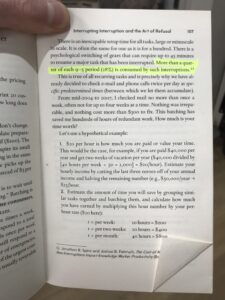
Separate the good from the great: If I am into or enjoying what I’m reading then I can end up highlighting something on every bloody page, that’s not the idea here. If I think what I’ve read can DEFINITELY be of use then it gets highlighted. When I’ve finished the book it gets left for a couple of weeks. Ryan Holiday emphasises this point greatly; going back in after 2-3 weeks helps to clear the head. A lot of what has been highlighted won’t seem as useful on the second pass, helping to separate the good from the great. What’s left is ready to be transferred to the notecards.
Subjects: It’s important to organise cards into the subjects that will be of use. Having separation cards helps with this process, I use colour co-ordination too which isn’t necessary but I am OCD so, for now, I’ll operate with both. The subjects I have thus far are; strategy, action, life, relations, business, spirituality. These are all areas that I think about in my own time and discuss when I write.
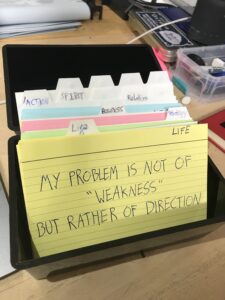
Transferring: I will write whatever I have chosen on to the centre of the card, as large as I can but ensuring I can still get it all on (I’m using 6×4 sized cards). In the top right hand corner of the card I’ll put the subject, Robert Greene doesn’t need to do this as he colour co-ordinates his subjects, Holiday doesn’t use coloured cards so uses this method. Currently I’m using both and it doesn’t take much more time I don’t think, perhaps, though, I’ll get more efficient as I go. Under the subject I may put in brackets what area of action to which what’s written may be applicable; decision making in action for example. At the bottom of the card I’ll put the author, the work that it’s taken from and the page. If the author is quoting someone else then I’ll add that too.

Technology Addiction
As mentioned previously, lockdown has really shown me just how much time I can waste with technology, particularly my phone. I say “particularly” my phone, the phone is actually 99.9% of it. I don’t play video games, if I sit at the laptop it is nearly always to do some writing or watch a documentary. The phone though, Christ! I can be lost for hours on it. As I talked about before with making notes on it, I’d come around 45 mins later realising I spent the best part of the last hour aimlessly scrolling down my Twitter newsfeed. I read The 4 Hour Work week by Tim Ferriss a while back and have begun to put a lot of what Ferriss discusses into action, particularly regards to checking internet based platforms like social media, emails and phone use. Again I have read a few trusted authors articles on the subject too. Below are some of the methods and boundaries I’ve been using to help curb wasted time on my phone, I don’t always follow them perfectly but even just practicing them has drastically reduced my time on tech:
Recognise & accept: I know that if I am not aware and present when I pick the phone up that I can slip into aimless browsing. I have to accept that it is an issue that needs addressing. I try to ask myself each time I pick the phone up “Why am I picking this phone up? Do I really need to? Am I bored?” If I don’t have the phone near me then it is not an issue. Simple.
Start as you mean to go on: The first 30 mins upon awakening is vital to a good day. I don’t have the phone in the bedroom. It stays down stairs; I wake up, drink water, shave, shower, breakfast, short daily readings, diary. I do that routine virtually everyday. A plan helps prevent drifting. When I get going I’m normally pretty good and my day goes well. To have a good start most days is a worthwhile trade for a £10 bedside alarm clock.
It’s a house phone: I try to treat my mobile like a house phone, leaving it next to the charger on the far side of the table, face down. Yes, I’ll take it with me if I leave the house for a few hours, not if I’m going out for a walk or bike ride though.
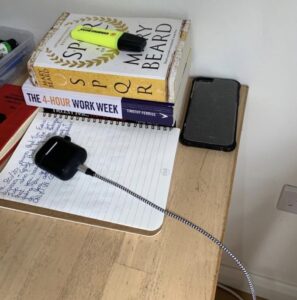
Check at specific times in the day: Set aside times to reply to texts and emails. I set aside a few time slots in the day to check and reply to emails, texts/whatsapp, social media messages etc. Currently I’m doing 8am, 1pm and 6.30pm, setting a daily alarm for those times, altering if needed depending on what I have on. Tim Ferriss recommends 10am and 4pm, I aim to get down to two soon. Still, just checking and replying 3 times per day has MASSIVELY cut my tech time alone. Apparently, according to Ferriss, nearly a third of the average workers working day is taken up by unnecessary distractions like email and text.
No non-vital notifications: I just turned them all off. I said to family and close friends what I’m putting in place and that if they ever need me then just ring. I will answer phone calls whenever to those people. I still check and reply to everything 3 times a day so the worse case scenario is a reply to a message sent a few hours previously. I’m not in any WhatsApp groups that I don’t absolutely need to be in.
Air pods: My girlfriend got me a set of these for my birthday, what a brilliant bit of kit they are. No wires connecting me to a phone. I don’t feel tethered. I can change song and answer calls by tapping them, pause by taking one out. I do change album on my phone occasionally but find it easier to just do that and put the phone down. Pricey but again well worth it.
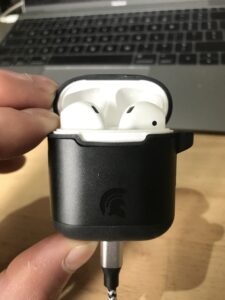
Other cheaper alternatives: Simple one, I got a cheap multi-clock kitchen timer so I didn’t have to pick my phone up for cooking. Anything like this where there is a cheap alternative it’s always worth the little investment. I also keep a book in the bathroom for when I’m…..er……combing my hair 😉
It’s never an emergency, when it is, can you actually do anything?: This was the big one for me. What if someone tries to contact me that is in dire straights? Well, covered before, if they really need me they will ring. I’ve never heard of anyone in a life or death situation that has sent a text. My calls are on loud so I’ll hear it. Also, if I am not right there can I actually do anything? My family are 180 miles away from where I currently live. If I leave right now it will still take me 3 hours to get there. What can I actually do right there and then in an emergency situation that normally occurs in seconds? Virtually nothing. So, when I go for a walk or bike ride for half an hour, hour, I leave the phone at home so I can be present with whom ever I’m out with, just like I’d leave it in the changing room when I go swimming. I did find this hard the first few times and was doing a bit of catastrophizing, it got easier and more enjoyable.
I hope you enjoyed this mini series of posts as much as I did writing them. I saw last week someone saying about them looking forward to 2020 being over. I know that I’ve been extremely lucky in this period; moved into a new house with my girlfriend ten days before lockdown started, we have a garden, my wages have been covered. I also feel incredibly grateful for how much my mum did for me growing up; Mum is an interested person. Yes, we spent loads of time at Judo but we also did so many different things at home; drawing, painting, reading, writing, crafts, go and see historical places, other sports, theatre, films etc. Mum would also always take the time to explain and talk to me about the things we did, discuss the meanings of songs or what we thought about specific books. This period really has confirmed to me that Mum passed that onto me, that I can always find something interesting to do. I need reminding of it from time to time though as I can sometimes get stuck in routines or, feel safe in them. I made the decision to stop drinking 18 months or so ago, I’d got into the classic routine of lots of work (Judo) and just drink/pub in my down time. One of the major concerns that I had when I stopped was “what will I do in my spare time if I don’t drink any more? How will I go to the pub and just drink Diet Coke for the rest of my life?!” That’s how wrapped up in that routine I’d become. Actually, now, I don’t have the time to fit in everything that I want to do. It took a bit of faith and of trying new things to begin with but that didn’t last too long. I now have loads of different activities at hand that I can do to enjoy myself, the idea of learning new skills is exciting not daunting. My Mum is a foster carer and I can see how much that she does for the kids in her care, how much that they are interested in. She gave me that gift too. I also understand that many weren’t as fortunate as I, I know a lot of people have been struggling over these past few months. If you or someone close to you is having it hard please find a list of contacts below that you may find useful:
Samaritans
Call- 116 123 (open 24 hours)
Website- https://www.samaritans.org
Crisis Text Line (any personal crisis)
Text SHOUT to 85258 to speak to a trained professional over text
Website- https://www.giveusashout.org/get-help/?gclid=EAIaIQobChMIxbDVr-u66gIVDOztCh3oGgAWEAAYASAAEgLkCvD_BwE
Mental Health Helpline (MIND)
Call- 0300 123 3393 (open 9am-6pm Mon-Fri)
Website- https://www.mind.org.uk
Overeaters Anonymous UK (any food related issues)
Call- 07798 587802
Website- https://www.oagb.org.uk
Narcotics Anonymous UK
Call- 0300 999 1212 (open 10am-midnight)
Website- https://ukna.org
Alcoholics Anonymous UK
Call- 0800 9177 650
Website- https://www.alcoholics-anonymous.org.uk
Gamblers Anonymous UK
Call- 0330 094 0322
Website- https://www.gamblersanonymous.org.uk
Workaholics Anonymous UK
Website- https://www.wa-uk.org
Sex Addicts Anonymous UK
Website- http://saauk.info/en/
Emotions Anonymous UK
Website- https://www.emotionsanonymous.org.uk
Thank you for reading, I really appreciate the support.
Have yourself a great week.
